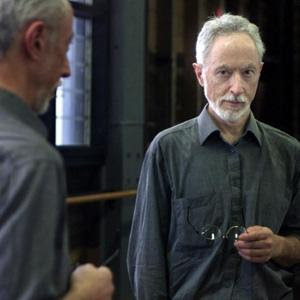J.M. Coetzee and his censors
Written by eastern writer on Sunday, July 20, 2008 J.M. Coetzee cuts a surprisingly dashing figure in person. Speaking last week at the University of East Anglia, as part of UEA’s New Writing Worlds season, Coetzee took to the stage with a loose walk, even a subtle swagger, in a perfectly pressed suit. He spoke on censorship, and then gave readings from two of his early novels, In the Heart of the Country (1977) and Waiting for the Barbarians (1980). His delivery was nuanced and witty, albeit with a sense of private restraint. At one point in the evening, I even saw him laugh.
J.M. Coetzee cuts a surprisingly dashing figure in person. Speaking last week at the University of East Anglia, as part of UEA’s New Writing Worlds season, Coetzee took to the stage with a loose walk, even a subtle swagger, in a perfectly pressed suit. He spoke on censorship, and then gave readings from two of his early novels, In the Heart of the Country (1977) and Waiting for the Barbarians (1980). His delivery was nuanced and witty, albeit with a sense of private restraint. At one point in the evening, I even saw him laugh.
Writing under the threat of censorship, Coetzee has said, is ‘like being intimate with someone who does not love you’, someone waiting for you to slip up, someone who measures your mistakes and then runs to tell their friends. Censorship has long been an obsession of his, but his attitudes have always been marked by subtlety. His essays on the subject, collected in Giving Offense (1996), ‘do not,’ he wrote, ‘constitute an attack on censorship’. Coetzee’s tone is always investigative and probing. With humility he wrote that ‘I cannot find it in myself to align myself with the censor… the dark-suited, bald-headed figure, with his pursed lips and his red pen’.
But as Coetzee explained last week – and as Peter D. McDonald reported in the TLS in 2000 (it’s surprising that Coetzee claims to have heard of the public existence of the censors’ internal reports only last year) – the reality of the author’s run-ins with the censors belies the popular image. Not only were the censors complimentary of the books – for example, one censor called In the Heart of the Country ‘outstandingly well-written’ – but they were themselves sophisticated readers known to Coetzee. Among them was H. van der Merwe Scholz, a professor at the University of Cape Town, where Coetzee also taught. Another was Anna M. Louw, herself a novelist based in the city. These censors were part of Coetzee’s intellectual and social world, drawn from the small South African intelligentsia who, Coetzee suggested, considered themselves to be ‘guardians of the Republic of Letters… book reviewers to the power of n’ protecting a space for literature from a philistine state.
But you’ll find no gratitude in Coetzee, no dedications in his books to some censor’s bureaucratic serial number. Here are some choice fragments of the censors’ reports on In the Heart of the Country, a novel in which there is sex – both consensual and forced – between white and black characters: there are ‘traces of protest literature’; the sexual intercourse ‘across the colour bar’ is ‘so firmly interwoven, even overwoven, by the sometimes almost hermetic style, that it won’t give any offence’; the novel will be ‘read and enjoyed only by intellectuals’; ‘it is difficult to abstract reality out of the spinster’s flights of imagination’. Despite In the Heart of the Country’s troubling and transgressive content, in the censors’ view the novel was rendered innocuous by a literary quality which curtailed the book’s likely readership. A classic defence.
So how did it feel for a writer who once said that he considered it ‘a badge of honour to have a book banned in South Africa’ to find out that the state’s literary representatives – his unloving readers – were actually on his side? How are we to interpret the disdain and sarcasm that spiked Coetzee’s voice as he quoted these lines?
The extract he read from In the Heart of the Country – the rich, speculative, Beckettian monologue of Magda, a lonely, disused and mistreated daughter on a farm in the middle of the Karoo – is telling. ‘I am a black widow, in mourning for the uses I was never put to’, the extract began. ‘But I have another sense of myself, glimmering tentatively somewhere in my inner darkness: myself as a sheath, as a matrix, as protectrix of a vacant inner space.’
But Magda’s protective retreat – her ‘sense of election’ – is weighed down in darker moments. She wonders ‘that if only I had a good man to sleep at my side, and give me babies all would be well… a man whom I would vow to bend down to a little lower, slave for a little harder than another woman would, whom I would have to disrobe for on Saturday nights, in the dark, so as not to alarm him, and arouse, if the arts of arousal can be learned, and guide to the right hole, rendered penetrable with a gob of chickenfat from a pot at the bedside’.
Here are sceptical attitudes to marriage and stark references to sex framed by a sophisticated speculative device: the ‘spinster’s flights of imagination’ that the censors thought exonerated the book from obscenity. But as a ‘protectrix of vacant inner space’ the speculation is part of the protest, an assertion of a controlling intelligence able to resist what Magda describes as ‘the bucolic comedy… not to be explained away by poverty, degeneracy, torpor or sloth’. The censors had excused the novel by privileging its literariness. But in so doing they had missed its power.
-------------
source: www.granta.com
 | Posted in »
| Posted in »




0 komentar: Responses to “ J.M. Coetzee and his censors ”